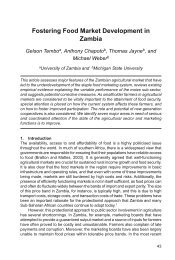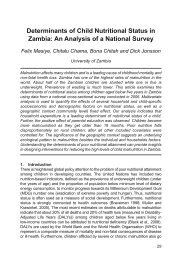Introduction to Basic Legal Citation - access-to-law home
Introduction to Basic Legal Citation - access-to-law home
Introduction to Basic Legal Citation - access-to-law home
Create successful ePaper yourself
Turn your PDF publications into a flip-book with our unique Google optimized e-Paper software.
California: Supreme Court citation practice | <strong>Citation</strong> rule(s)<br />
164<br />
Contents | Index | Help | < | ><br />
Examples from Zuckerman v. Bd. of Chiropractic Exam'rs, 29 Cal. 4th 32, 53<br />
P.3d 119, 124 Cal. Rptr. 2d 701 (2002)<br />
. . . .<br />
Under California <strong>law</strong>, the State Board of Chiropractic Examiners (Board) may discipline any<br />
chiroprac<strong>to</strong>r who engages in professional misconduct. A chiroprac<strong>to</strong>r accused of misconduct<br />
is entitled <strong>to</strong> a hearing before an administrative <strong>law</strong> judge, whose proposed decision is<br />
reviewed by the Board. A chiroprac<strong>to</strong>r found <strong>to</strong> have committed misconduct may be ordered<br />
<strong>to</strong> pay the "reasonable costs of investigation and prosecution of the case," including at<strong>to</strong>rney<br />
fees, that the Board incurred "up <strong>to</strong> the date of the hearing . . . ." ( Cal. Code Regs., tit. 16, §<br />
317.5.)<br />
. . . .<br />
Hearings are ordinarily held before an administrative <strong>law</strong> judge employed by the Office of<br />
Administrative Hearings. ( Gov. Code, §§ 11502, 11517.) After a hearing, the administrative<br />
<strong>law</strong> judge submits a proposed decision <strong>to</strong> the Board (id., § 11517, subd. (c)), which may adopt<br />
it, reduce the proposed penalty, or, as occurred in this case, reject the proposed decision and<br />
decide the case itself. If the Board chooses the latter option, it may base its decision on the<br />
record of the hearing before the administrative <strong>law</strong> judge (as occurred here) or it may take<br />
new evidence. (Ibid.) The Board's decisions are subject <strong>to</strong> judicial review by administrative<br />
mandamus. ( Code Civ. Proc., § 1094.5.)<br />
. . . .<br />
Zuckerman argues that regulation 317.5 is facially unconstitutional. He claims it violates his<br />
due process rights by discouraging chiroprac<strong>to</strong>rs whom the Board has accused of misconduct<br />
from requesting a hearing on the charges. We evaluate the merits of a facial challenge by<br />
considering [*39] "only the text of the measure itself, not its application <strong>to</strong> the particular<br />
circumstances of an individual." ( Tobe v. City of Santa Ana (1995) 9 Cal. 4th 1069, 1084, [40<br />
Cal. Rptr. 2d 402, 892 P.2d 1145].) A plaintiff challenging the facial validity of a statute<br />
"cannot prevail by suggesting that in some future hypothetical situation constitutional<br />
problems may possibly arise as <strong>to</strong> the particular application of the statute." ( Pacific <strong>Legal</strong><br />
Foundation v. Brown (1981) 29 Cal.3d 168, 180, [172 Cal. Rptr. 487, 624 P.2d 1215].)<br />
. . . .<br />
Zuckerman also argues that the Board's enabling legislation does not authorize regulation<br />
317.5, and that the regulation therefore exceeds the Board's jurisdiction. The Court of Appeal<br />
summarily rejected the claim, relying on Oranen v. State Board of Chiropractic Examiners<br />
(1999) 77 Cal. App. 4th 258, 261-263 [90 Cal. Rptr. 2d 287], which held that regulation 317.5<br />
is authorized by sections 4 and 10 of the Act. We do not address this issue because it is not<br />
within the scope of our order granting the Board's petition for review.




